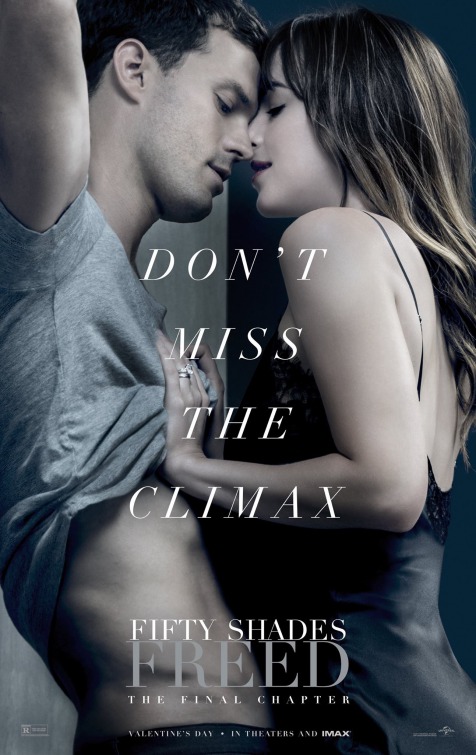by Chris Feil
 Christian Grey and Anastasia Steele’s romantic tale of trust and submission comes to a close with Fifty Shades Freed. Opening on their wedding ceremony, the couple still has quite a bit to reconcile before they truly land the fairy tale ending the genre promises. As Anastasia’s career flourishes, her stalker and former boss reemerges to threaten their relationship and the Grey family as well.
Christian Grey and Anastasia Steele’s romantic tale of trust and submission comes to a close with Fifty Shades Freed. Opening on their wedding ceremony, the couple still has quite a bit to reconcile before they truly land the fairy tale ending the genre promises. As Anastasia’s career flourishes, her stalker and former boss reemerges to threaten their relationship and the Grey family as well.
Things remain silly. There’s more sex this time around but its handily the least titillating of the three films by good margin. There are car chases, sudden violent attacks, a kidnapping plot, and of course lots of pseudo-kinky coitus to be seen, because the series is nothing if not delightfully ludicrous. This time however is a more snoozy bit of outlandish.
You would kind of miss this affably goofy series had this closer not buffed itself into beigeness. As the saga has become old news, this third installment has a passably brisk delivery that plays more as obligation than enthusiasm. While it’s not uncommon for these b-level franchises to run out of gas at their finish line, Freed is particularly lifeless. Even as the film slightly leans into comedy territory, its milquetoast rendering has little interest in keeping things lively and decidedly free of real guts. This series may have produced some unabashed laughable turns, but the flat Freed proves those moments to be the trilogy’s greatest source of delight by being nowhere near as fun.

The trilogy’s lurching pacing has made for three rather amorphous films. Conflicts still arise and deflate at breakneck speed and then are dropped entirely. Again, Christian and Anastasia’s courtship plays like an extended clip reel for a television show, a disembodied array of peaks and valleys without forward trajectory. Freed has less distractions and needless subplots than its predecessors, yet has the flattest narrative arc. No matter the clunkiness that has come before this, you’ll wish for more of a swing for the fences of wildness.
The most prominent of the film’s perversions is never its sexual goings on, but the fetishization of luxury living and glossy materialism - and even this is limited in its ability to delight. Its consumerist streak is on bland display, its faux taste resulting in expensive-looking but sterile production design that underlines its lack of imagination and empty fantasy. The opening wedding sequence is more breathy Zales ad than swoony happily-ever-after fantasy the audience demands. Without the motivation to make Freed a fun indulgence for the audience, its globe-trotting and interior design pageantry come off more as Restoration Hardware catalogs and tourism pamphlets. Visit Aspen. Discover: France.
But perhaps the most dire of Freed’s proceedings is its steadfast assurance of the heteronormative nuclear unit. Its peak drama is Anastasia’s sudden pregnancy, drawing cliched abhorrence from Christian and reductively gendered response from Anastasia. The series is at its most cringey when its archaic gender roles reveal what a dated enterprise the supposedly transgressive story is, and Freed is the greatest offender.

As ever, the series’ greatest asset is the game and confident performance by Dakota Johnson as Anastasia. Say what you will about the unrealistic characterization that Johnson is tasked with, but the actress consistently pulls off the feat of making Anastasia believable despite the silliness around her. As with the past films, her performance is witty and diverts some of the nonsense she speaks, making the character’s sexual interplay and discovery more engaging than the film wishes it to be. Dornan however remains a cold fish onscreen.
Ending in a montage of the series highest drama and most romantic moments, Freed ends with a reminder that its closer was its most forgettable chapter. This climax is a fake out.
Grade: D